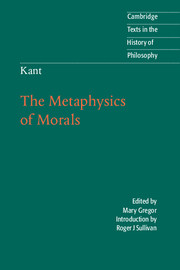Introduction
Summary
A sketch of Immanuel Kant's life takes very little space. Except for a conflict with the royal censor over his writings on religion, he led the quiet life of a faculty member within a small eighteenth-century European university. He was born in Königsberg, East Prussia, 22 April 1724, and he died there 12 February 1804, never having left the Königsberg area, where he taught first as a private tutor and then, for some twenty-five years, served as Professor of Logic and Metaphysics. So influential have been his publications, however, that, like Plato before him, no one after him could do philosophy without taking him into account. Even today his remains the premier moral theory. Although his political philosophy has not had the same impact as his ethical doctrines, it did anticipate the classical liberalism underlying republican forms of government today.
Kant had written about morality in several of his earlier works, but The Groundwork (or Foundations) of the Metaphysics of Morals, published in 1785, was his first book devoted exclusively to ethical theory. As its title indicates and as Kant also stated in its preface, this book was intended to provide the foundations or groundwork for a future work entitled The Metaphysics of Morals. He had claimed to be writing a book on that topic as early as 1768, but he did not actually publish this volume until 1797. (The Critique of Practical Reason was published in 1788 and the Critique of Judgment in 1790.) Given the time he had to think about its contents and the fact that he waited until near the end of his professional life to issue it, presumably The Metaphysics of Morals reflects his most mature views on the topics discussed in it.
- Type
- Chapter
- Information
- Kant: The Metaphysics of Morals , pp. vii - xxviPublisher: Cambridge University PressPrint publication year: 1996



